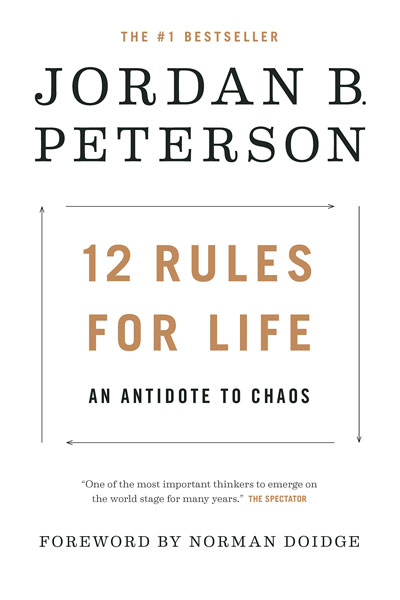

This article is an excerpt from the Shortform summary of "12 Rules for Life" by Jordan Peterson. Shortform has the world's best summaries of books you should be reading.
Like this article? Sign up for a free trial here .
In 12 Rules for Life, Rule #8 is “Tell The Truth – Or At Least Don’t Lie.” What does this mean? Why is lying so bad to yourself? Why is telling the truth so good?
This rule discusses not only lying to others, but also lying to yourself and obscuring your personal truth. Instead, you need to develop your personal truth, then act consistently with it. This chapter is fairly abstract, but try to see if its principles resonate with a specific problem you have in life.
Overview of Jordan Peterson’s Rule 8
Why You Lie
Day to day, you may lie to the outside world to get what you want and to avoid pain. You tell lies to appear more competent, to gain status, to be well-liked, to prevent conflict. This is you manipulating the world.
On a deeper level, you may lie to yourself about what you want. You might have a dream life envisioned by your younger self, without probing carefully into whether you really want it (career and retirement goals are common examples here). You may entertain ideas about what you really want, but deceive yourself into thinking they’re impossible to reach or undesirable after all. You then act in ways that you paper over with more lies, but deep down you know it’s inconsistent with your beliefs, and you feel unsettled.
Beware of the big lie (in Hitler’s terms) something so large and audacious that you cannot accept someone would intentionally fabricate it. This could be about who to blame for your faults, or what you should do with your life.
According to 12 Rules for Life, you may not be actively misleading other people, but merely lying by omission. This isn’t any better. If your boss does something you dislike, not confronting her about it is still lying – you’re acting inauthentically, not in accordance with your beliefs. If you habitually avoid conflict, don’t complain when mistreated, and suppress your own ideas, you’re still lying to yourself. This makes you feel weak, because your existence has little real meaning. You’ve become a tool to be used, obliterating your independence.
Even worse, on a meta level, you may be in denial about lying to yourself. You may believe that your truth is the only truth, and that no amount of new knowledge can change what you believe. That all important facts have been discovered, and that everything will work out perfectly.
Your lie may begin with protecting yourself from reality. You may believe reality is intolerable and must be distorted. You want to avoid that short-term pain. But after a certain point, the lies take on a life of their own.
- First you start with a little lie, then support it with further little lies.
- Then you distort your thinking to avoid shame of those lies.
- Then those lies become necessary and become ritualized into unconscious action.
- The longer you lie, the more you believe it, and the harder it is to undo.
Why Lying is So Bad
All the lying may work in the short term, but ultimately you will run into failure. If you betray yourself, if you act out a lie, you weaken your character. If you have a weak character, adversity will bulldoze you. By failing to react the first time, you’ve already trained yourself to tolerate things you disagree with.
According to Jordan Peterson’s Rule 9, this leads to bitterness. Because you are avoiding pain and fabricating your world, you are likely to avoid personal responsibility for your failures. You will blame the world as unfair, and other people as getting in your way. It’s not hard to take this one step further to believing “they must be stopped,” and another step further into revenge.
All this applies to many levels of existence. You may be lying to yourself:
- About what you want to do with the rest of your life.
- That you enjoy a job that actually bites against your being.
- That you continue relationships you know are toxic, under the guise of convenience or comfort.
- That you’re not capable of something, that it’s not worth trying, even though deep down you know you really want it.
- That a bad habit really isn’t that bad, or actually good for you.
- That things will get better on their own and things will magically work out without your involvement.
- That you know what you’re doing in life, when really you’re too scared to confront uncertainty.
Clearly telling lies to yourself leads to bad outcomes and misery. What do you do?
How to Tell the Truth
Step 1) Develop your personal truth.
Figure out what you really want and why. If you don’t know what you want, you can start with tradition and work from there. Your truth is truly personal to you, based on you and your circumstances.
Ambitions based around developing character and ability are better than status and power. You can lose status, sometimes in ways out of your control; but no matter what happens, you carry character whereever you go.
(Shortform note: because people have different truths, naturally people should have different goals. And as we learned in Rule 4, this means comparing yourself to other people is pointless.)
According to 12 Rules for Life, confronting the idea that you’ve been lying to yourself will likely be painful. Error requires sacrifice to correct it. The larger the error, the larger the sacrifice you need. This may mean accepting weaknesses you didn’t want to confront earlier. It may mean having conflicts with people you were lying to before. This is the cost of getting on the right track, but it’s worth it.
Once you develop a personal truth, it gives you a destination to travel toward. It gives you a personal code of conduct to act by. Having a personal truth reduces anxiety, because having either everything or nothing available are far worse options.
Step 2) Act only consistently with your personal truth.
Speak in a way that makes you feel strong, not weak. Act only in ways that your internal voice does not object to. A lie spoils all the truth it touches, like a tiny drop of sewage in a bottle of wine.
Are you doing anything you know is wrong? Stop it today. Stop when you feel an inkling that you should stop. Stop saying things that make you feel ashamed and cowardly; start saying things that make you feel strong. Do only those things about which you would speak with honor. This is how you can live the creed, “Tell the Truth.”
Stand up for your beliefs. If you say yes when you want to say no, you weaken your resolve and become habituated to violating your beliefs. You will lack the strength when you really need it. Instead, when you say no, you transform yourself into someone who can say no when it needs to be said. Nietzsche said that “the strength of a person’s spirit” is “measured by how much truth he could tolerate…to what extent he needs to have it diluted, disguised, sweetened.”
Step 3) Keep an open mind to new information and keep adjusting your truth.
Be willing to learn from what you don’t know. While tradition is a good start, it may no longer apply if the circumstances have truly changed. Putting yourself in new situations will literally grow your brain. Transform your values as you progress.
Telling the Truth, on All Levels
Again, all of Jordan Peterson’s Rule 9 applies to many levels of existence.
- From the deepest level, it means defining what you want to do with your life, and shifting your time and energy to achieving progress in that direction.
- It means defining what kinds of relationships you want with people, and reconstructing ones that don’t meet your wants.
- It means doing something about things you disagree with in the world – how a country is moving, a policy your employer enacts, how you see a stranger treat another stranger.
- It means telling your friend or partner what you really think, at the expense of a conflict for a longer-term gain.
What do you do when you don’t know what to do? Tell the truth. At the very least, you will be trusted for being honest, and you’ll feel the strength that comes with authenticity.
———End of Preview———

Like what you just read? Read the rest of the world's best summary of "12 Rules for Life" at Shortform . Learn the book's critical concepts in 20 minutes or less .
Here's what you'll find in our full 12 Rules for Life summary :
- Why standing up straight will make people treat you differently
- How to find meaning in your life and work
- Why you're lying to yourself without realizing it






